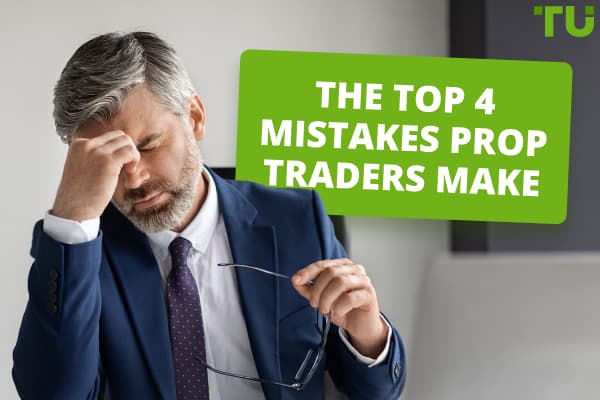How to start day trading on the funded account
According to Traders Union’s experts, in order to become a day trader in a prop company, you should:
Research and compare firms
Apply for a funded trading program
Complete an evaluation period
Access training and mentorship
Specialize in an asset class
Plan your trading strategies.
Day trading can be an exciting and potentially lucrative career path for individuals interested in the stock market. However, it can also be a challenging endeavor, requiring discipline, knowledge, and a significant amount of capital. To overcome some of these barriers, one option for aspiring day traders is to join a prop trading company, which can provide access to funding and resources to help traders get started. So, in this article, the experts at TU will discuss the process of becoming a day trader and how a prop trading firm can assist in achieving this goal. They will also explain how to get funded in a prop trading company, which is an essential step for traders looking to establish a steady financial basis.
Fund your account with SurgeTrader!Is it difficult to become a day trader?
Becoming a day trader may seem like a challenging endeavor for novice traders. While it's possible to succeed without assistance, there are typical difficulties that traders may face, which may include:
Insufficient start-up capital: Many novice traders may not have enough capital to start trading, which forces them to increase the risk. This ultimately leads to losses.
Pattern day trading rule: In the US, traders must adhere to the 25,000 pattern day trading rule. This can be a significant investment that not everyone can afford.
No risk manager: Novice traders may not have access to a risk manager who could assist them in challenging situations.
Over and above these, day trading is a difficult exercise due to several more reasons. One of them is the presence of multiple catalysts that influence financial assets, making it challenging for most people to decipher. Additionally, traders must learn numerous concepts, such as technical and fundamental analysis, which can be overwhelming. The market's extreme volatility also makes it difficult to operate, and novice traders can become impatient with a desire to succeed quickly. So, in this profession, patience is one of the core traits one must have.
How to Become a Prop Trader? A guide for beginnersHow can a prop trading firm help?
According to experts, a prop trading firm can contribute to you day trading journey in the following aspects:
Capital access: Prop trading firms can provide traders with access to capital, which can be used to start trading or expand their trading accounts. This capital can enable traders to take on larger positions and potentially increase their profits.
Education and training: Prop trading firms often offer education and training programs to traders, which can help them learn different trading strategies and gain a better understanding of the market. These programs can benefit traders at all levels of experience.
Support and mentoring: Prop trading firms typically have experienced traders who can offer support and mentoring to new traders. This can include guidance on trading strategies, risk management, and general industry knowledge.
Risk management: Prop trading firms employ risk management teams to help traders manage their risks and avoid costly mistakes. These teams can monitor trades in real-time, set position size limits, and provide feedback to traders to improve their strategies.
Trading technology: Prop trading firms have access to advanced trading technology, including trading platforms, data feeds, and analytical tools. This technology can provide traders with a competitive edge in the market, allowing them to execute trades more efficiently and make better-informed decisions.
What are the drawbacks of prop trading accounts?
When considering funded trading programs, it's important to be aware of their drawbacks. Here are some of the typical shortcomings you may face, as highlighted by our experts:
Difficult to qualify: It can be difficult to qualify for a prop trading account, as firms often have strict requirements for traders. This can include a minimum level of experience or specific trading skills.
Strict rules: Prop trading firms often have strict rules in place for their traders, including limitations on the types of trades they can make and the amount of leverage they can use. These rules can limit a trader's ability to take advantage of market opportunities.
Subscription fees: Proprietary trading involves fees, including software fees that can start at $200 per month. These fees can eat into a trader's profits and impact their bottom line.
Risk: As a proprietary trader, your deposit is not insured and is liable for business risk and fraud. This means that you need to deposit only money you can afford to lose. Additionally, proprietary firms are less regulated than retail brokers, which can make them more vulnerable to fraud and financial mismanagement.
Day trading focus: Prop trading firms typically focus on day trading, which can limit a trader's ability to take advantage of longer-term market trends. Moreover, high leverage only applies to day trading, and most firms do not allow overnight positions.
How to get funded in a prop trading company?
To become a funded trader in a prop trading company, there are several steps you need to take. Here's our expert-suggested course of action:
Conduct thorough research and assess platforms: Prior to registering with a prop trading firm, it's crucial to evaluate various firms to identify the one that aligns with your requirements. Consider aspects such as the trading platforms utilized, minimum capital prerequisites, fees, customer support, and additional factors.
Submit an application for a financed trading program: Complete an application form, supplying details about your background, education, and trading expertise. The firm may require you to participate in a trading challenge or an interview to discuss your trading abilities and experience, depending on their specific process.
Fulfill the assessment period requirements: After being accepted into the program, you must undergo an evaluation phase. During this stage, you must demonstrate your capacity to generate profits and fulfill the company's criteria to progress to the subsequent level.
Seek training and mentorship opportunities: Utilizing the training and mentorship resources provided by the firm can assist you in navigating the industry and gaining valuable insights on becoming a successful trader. Opt for programs that offer personalized coaching sessions, market analysis, feedback from seasoned traders, and access to cutting-edge technologies and analytical instruments.
Identify your niche: Focusing on a specific asset class enables you to refine your skills and become increasingly proficient in trading it over time. For instance, you can select a firm that provides access to your desired financial markets and algorithmic trading systems.
Develop your trading plan: Before engaging in trades with a proprietary trading firm, it's essential to devise your strategies. This involves establishing risk management guidelines, entry and exit plans, and other factors. By preparing your approach beforehand, you can optimize your trades and boost profitability in the long run.
How to start day trading with your own investments?
Expand your knowledge: Achieving success in day trading necessitates a solid grasp of trading practices and staying current with stock market news and events. Make a habit of reading business news and follow trustworthy online sources to remain well-informed.
Determine capital allocation: Prior to initiating day trading, evaluate and decide the proportion of capital you're willing to risk on each transaction. Seasoned day traders typically risk no more than 1% to 2% of their account balance per trade. It's crucial to designate a surplus amount of funds for trading, which you're comfortable with potentially losing.
Commit time and focus: Day trading demands both time and concentration. Traders must devote a significant portion of their day to monitoring the markets and identifying opportunities that can emerge at any moment during trading hours. If your schedule doesn't allow for ample time, day trading may not be suitable for you.
Begin with a modest approach: For novices, it's advisable to concentrate on one or two stocks per session. This enables more manageable tracking and identification of opportunities. Additionally, consider trading fractional shares, which allow you to invest in smaller dollar amounts.
Adhere to your strategy: Successful day traders formulate a trading plan in advance and possess the discipline to abide by it. It's essential to closely adhere to your established strategy rather than pursuing profits impulsively. Execute your trades according to your plan, and prevent emotions from interfering with your decisions.
Top 3 prop trading accounts to consider
How to choose a funded trading account?
Choosing a funded trading account can be a daunting task, but it's important to take your time and consider several factors before making a decision. Here are some of the key variables to keep in mind, as suggested by our experts:
Profit Split/Profit Share: The percentage of profits that the trader gets to keep is a critical factor. Different firms offer varying profit split or profit share arrangements. Some may offer a higher profit split, while others may offer a more favorable profit share. It's important to choose a firm that offers a fair and lucrative profit split or profit share arrangement.
Evaluation process: The evaluation process that determines whether the trader is eligible for funding from the prop firm is another essential factor to consider. Choose a firm that has a transparent and fair evaluation process. A good evaluation process should test a trader's skills and assess their potential to trade effectively with the firm's capital.
Available markets: The variety of markets that the firm offers impacts considerably on a day trader’s ability to perform. Choose a firm that specializes in the markets you're interested in or offers a wide range of markets. Some firms may specialize in Forex or commodities trading, while others may offer a diverse range of markets, including equities, futures, and options.
Available leverage: Choose a firm that offers the appropriate level of leverage according to your trading style. Also, remember that while leverage can magnify profits, it also increases risk. Therefore, choose a firm offering a leverage level that matches your risk tolerance.
Available customer support: Good customer support is essential for any trader. Choose a firm that offers responsive and helpful customer support to address any questions or issues that may arise. It's important to choose a firm that provides multiple channels of support, such as email, phone, and live chat, and has a dedicated team of support staff.
Reliable trading platform: A reliable trading platform is crucial for executing trades effectively. Choose a firm that offers a stable and user-friendly trading platform with a variety of tools and features. The platform should allow traders to execute trades quickly and efficiently and provide access to real-time market data, news, and analysis.
How do you trade successfully?
According to seasoned traders, the following factors are crucial to day trading success:
Employ a well-defined trading strategy: A vital aspect of successful trading is the consistent use of a well-defined trading strategy. This strategy comprises written guidelines detailing a trader's entry, exit, and financial management principles for every transaction. Crafting an effective trading strategy demands time and dedication, and once it has been validated with historical data, it can be implemented in live trading. It's also crucial to recognize that a strategy may sometimes fail, necessitating the trader to abandon it and start anew. Success lies in adhering to the strategy, as executing trades outside of the plan, even if successful, is deemed unwise.
Approach trading as a business venture: For success in trading, it is essential to treat it as a full-time or part-time business rather than a hobby or employment. Viewing trading as a hobby demonstrates a lack of dedication to learning, while treating it as a job can lead to frustration due to the absence of a regular income. Trading involves costs, losses, taxes, uncertainty, stress, and risk, much like any business. So, traders must conduct thorough research and devise strategies to optimize their business potential, just like other small business owners.
Leverage technology to gain an edge: Technology is integral to trading, and traders should harness it to remain competitive. Charting tools offer traders countless ways to observe and assess market conditions. Backtesting ideas with historical data can help avoid expensive mistakes. Receiving market updates on a smartphone enables traders to track trades from any location. Finally, staying up-to-date with new products and leveraging technology can make trading both enjoyable and profitable.
Safeguard your trading capital: Accumulating sufficient funds for a trading account demands considerable time and effort, making it essential to safeguard that capital. Traders should never consider using money allocated for crucial commitments, such as a child's college education or mortgage payments. Losing money is distressing enough without risking capital that should never have been exposed to risk. Focus on protecting your capital, which involves avoiding unnecessary risks and taking all possible measures to preserve your trading venture.
Maintain a holistic perspective on trading: Successful traders must consider the bigger picture. Profitable trades are merely one component of a thriving business, and losses are an inevitable aspect of trading. It is crucial to establish realistic goals and recognize that a reasonable return on investment should be achieved within a reasonable time frame. By accepting wins and losses as part of the trading process, emotions will have a lesser impact on overall performance.
Is a day trading in a prop company worth it?
Day trading can be a lucrative career path, but it's not without its challenges. If you're considering joining a prop trading firm, there are some things you need to consider.
First, you need to research the trading account rules to find out about profit share rules. The percentage of profits that you get to keep is a key factor in determining whether a prop trading account is worth it. Profit share rates vary from firm to firm, so you need to do your homework to find the most favorable arrangements.
However, keep in mind that your profit depends on your trading performance. Prop trading firms typically evaluate their traders on a regular basis, and if you don't meet the firm's performance standards, you may not be eligible for funding or may lose your funding altogether.
Trading with a prop firm can provide a great opportunity for traders who want to increase their exposure to different markets and take advantage of the knowledge and expertise of seasoned traders. With access to top-of-the-line technology and resources, prop trading firms offer traders the opportunity to capitalize on more profitable trading opportunities than individual traders typically have access to.
Is Trading for a Prop Firm Worth It? How Much Can I Earn?FAQ
How to become a day trader with $100?
It is not recommended to become a day trader with only $100 as it is not enough capital to trade effectively and might lead to improper position-sizing in trades.
How much money do you need to start day trading?
To day trade in the US, you need a minimum of $25,000 in your account. However, some brokers may allow you to start with less capital.
What is a pattern day trading rule?
A pattern day trading (PDT) rule is a regulatory designation mandated in the US by FINRA that requires traders who execute four or more day trades over a five-business-day period in a margin account to have a minimum of $25,000 in their account.
Is it realistic to become a day trader?
It is possible to become a successful day trader with the right mindset, education, and experience. However, it requires a lot of hard work, discipline, and risk management.
Glossary for novice traders
-
1
Volatility
Volatility refers to the degree of variation or fluctuation in the price or value of a financial asset, such as stocks, bonds, or cryptocurrencies, over a period of time. Higher volatility indicates that an asset's price is experiencing more significant and rapid price swings, while lower volatility suggests relatively stable and gradual price movements.
-
2
Day trading
Day trading involves buying and selling financial assets within the same trading day, with the goal of profiting from short-term price fluctuations, and positions are typically not held overnight.
-
3
Day trader
A day trader is an individual who engages in buying and selling financial assets within the same trading day, seeking to profit from short-term price movements.
-
4
Forex Risk Management
Risk management in Forex involves strategies and techniques used by traders to minimize potential losses while trading currencies, such as setting stop-loss orders and position sizing, to protect their capital from adverse market movements.
-
5
Trading system
A trading system is a set of rules and algorithms that a trader uses to make trading decisions. It can be based on fundamental analysis, technical analysis, or a combination of both.
Team that worked on the article
Chinmay Soni is a financial analyst with more than 5 years of experience in working with stocks, Forex, derivatives, and other assets. As a founder of a boutique research firm and an active researcher, he covers various industries and fields, providing insights backed by statistical data. He is also an educator in the field of finance and technology.
As an author for Traders Union, he contributes his deep analytical insights on various topics, taking into account various aspects.
Dr. BJ Johnson is a PhD in English Language and an editor with over 15 years of experience. He earned his degree in English Language in the U.S and the UK. In 2020, Dr. Johnson joined the Traders Union team. Since then, he has created over 100 exclusive articles and edited over 300 articles of other authors.













